Загрязнение мирового океана.pptx
- Количество слайдов: 12
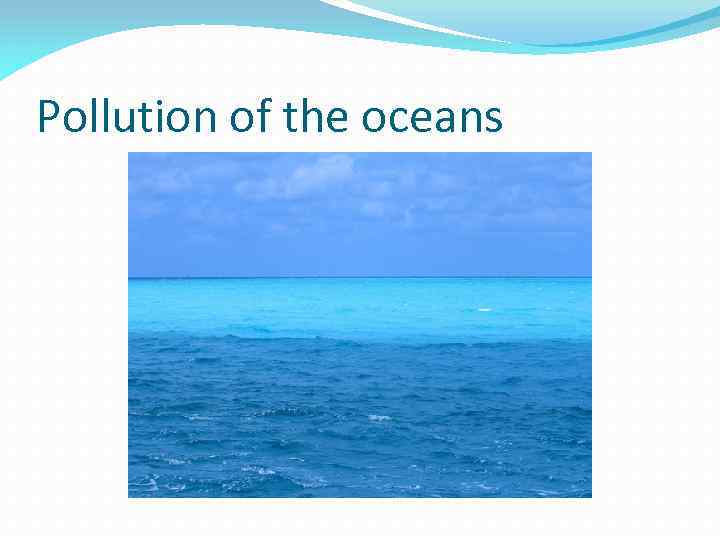 Pollution of the oceans
Pollution of the oceans
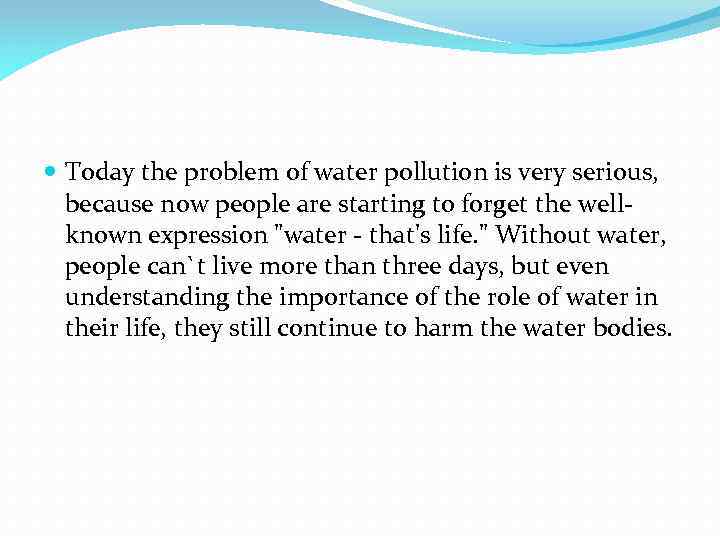 Today the problem of water pollution is very serious, because now people are starting to forget the wellknown expression "water - that's life. " Without water, people can`t live more than three days, but even understanding the importance of the role of water in their life, they still continue to harm the water bodies.
Today the problem of water pollution is very serious, because now people are starting to forget the wellknown expression "water - that's life. " Without water, people can`t live more than three days, but even understanding the importance of the role of water in their life, they still continue to harm the water bodies.
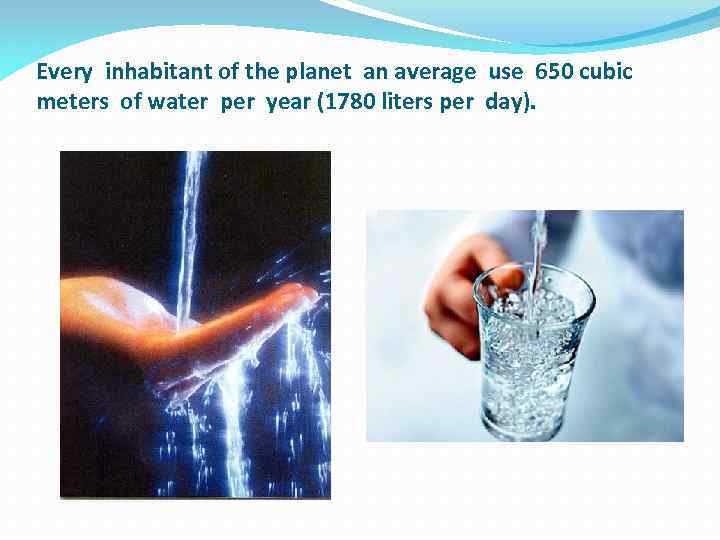 Every inhabitant of the planet an average use 650 cubic meters of water per year (1780 liters per day).
Every inhabitant of the planet an average use 650 cubic meters of water per year (1780 liters per day).
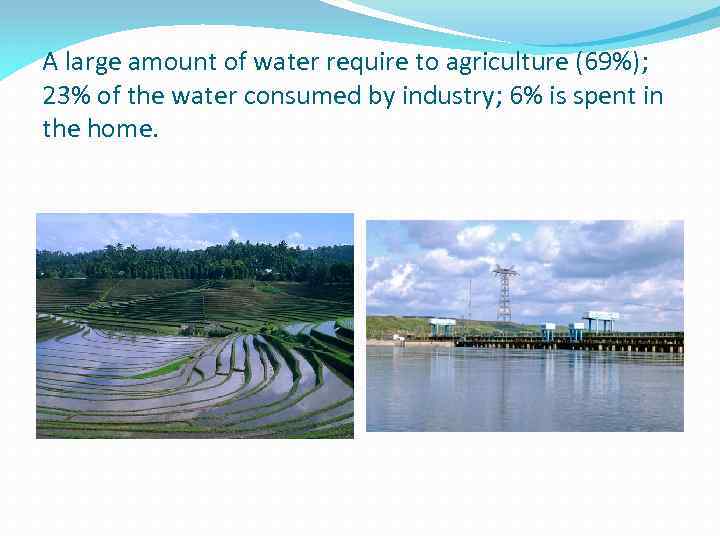 A large amount of water require to agriculture (69%); 23% of the water consumed by industry; 6% is spent in the home.
A large amount of water require to agriculture (69%); 23% of the water consumed by industry; 6% is spent in the home.
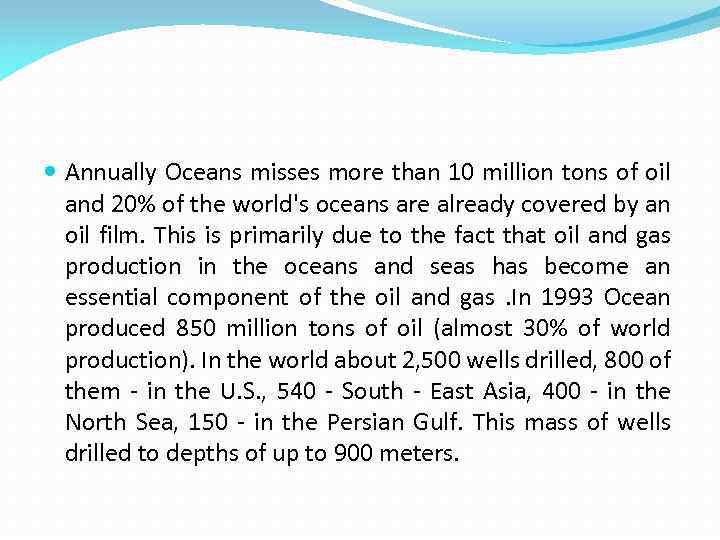 Annually Oceans misses more than 10 million tons of oil and 20% of the world's oceans are already covered by an oil film. This is primarily due to the fact that oil and gas production in the oceans and seas has become an essential component of the oil and gas. In 1993 Ocean produced 850 million tons of oil (almost 30% of world production). In the world about 2, 500 wells drilled, 800 of them - in the U. S. , 540 - South - East Asia, 400 - in the North Sea, 150 - in the Persian Gulf. This mass of wells drilled to depths of up to 900 meters.
Annually Oceans misses more than 10 million tons of oil and 20% of the world's oceans are already covered by an oil film. This is primarily due to the fact that oil and gas production in the oceans and seas has become an essential component of the oil and gas. In 1993 Ocean produced 850 million tons of oil (almost 30% of world production). In the world about 2, 500 wells drilled, 800 of them - in the U. S. , 540 - South - East Asia, 400 - in the North Sea, 150 - in the Persian Gulf. This mass of wells drilled to depths of up to 900 meters.
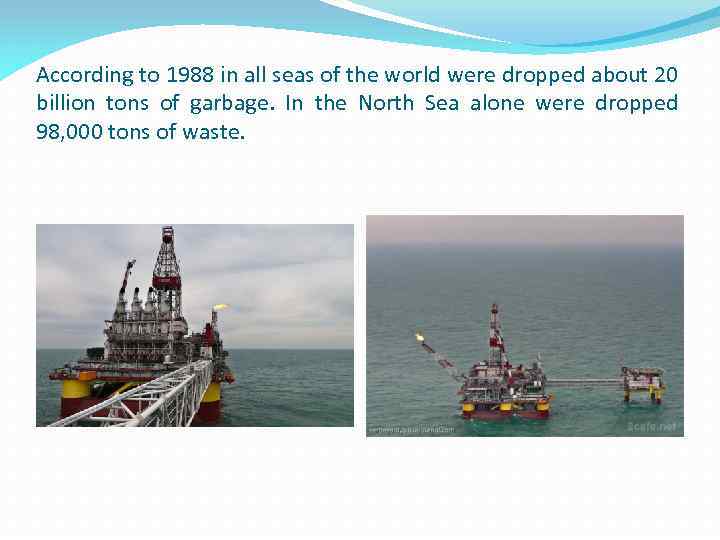 According to 1988 in all seas of the world were dropped about 20 billion tons of garbage. In the North Sea alone were dropped 98, 000 tons of waste.
According to 1988 in all seas of the world were dropped about 20 billion tons of garbage. In the North Sea alone were dropped 98, 000 tons of waste.
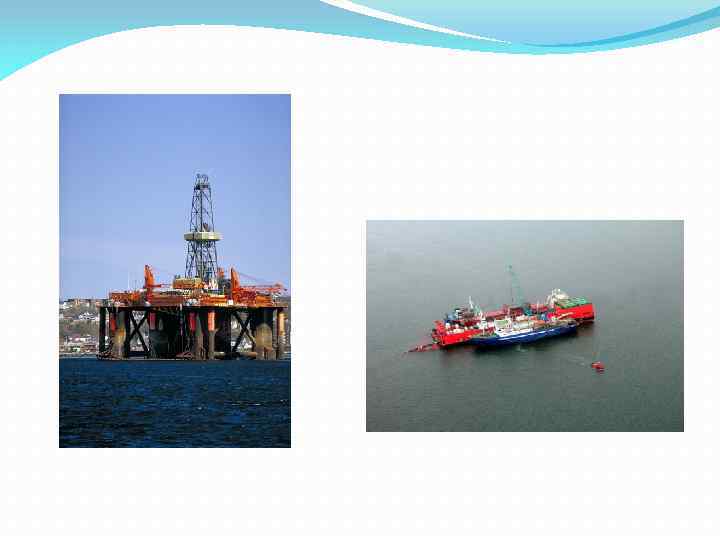
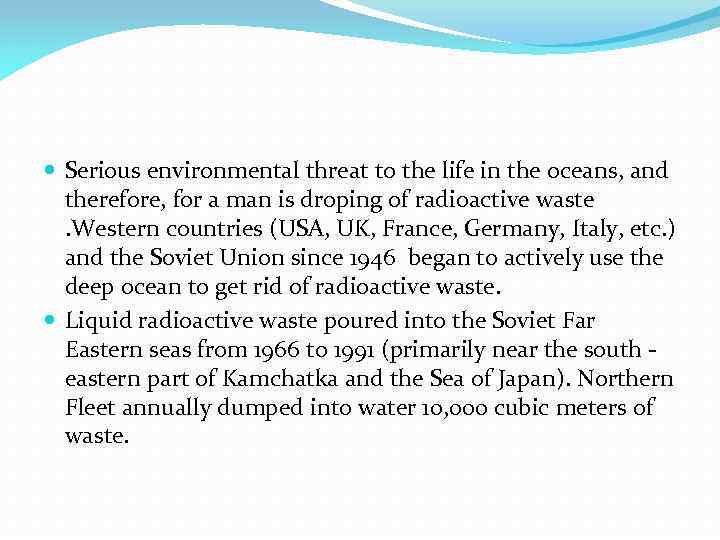 Serious environmental threat to the life in the oceans, and therefore, for a man is droping of radioactive waste. Western countries (USA, UK, France, Germany, Italy, etc. ) and the Soviet Union since 1946 began to actively use the deep ocean to get rid of radioactive waste. Liquid radioactive waste poured into the Soviet Far Eastern seas from 1966 to 1991 (primarily near the south eastern part of Kamchatka and the Sea of Japan). Northern Fleet annually dumped into water 10, 000 cubic meters of waste.
Serious environmental threat to the life in the oceans, and therefore, for a man is droping of radioactive waste. Western countries (USA, UK, France, Germany, Italy, etc. ) and the Soviet Union since 1946 began to actively use the deep ocean to get rid of radioactive waste. Liquid radioactive waste poured into the Soviet Far Eastern seas from 1966 to 1991 (primarily near the south eastern part of Kamchatka and the Sea of Japan). Northern Fleet annually dumped into water 10, 000 cubic meters of waste.
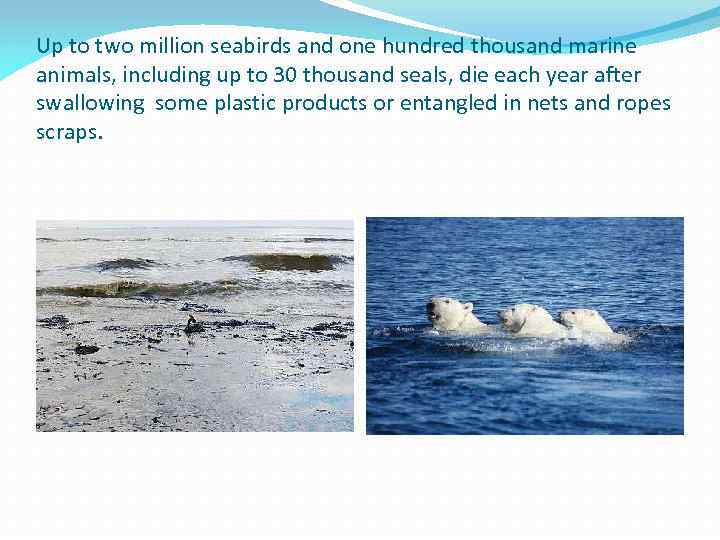 Up to two million seabirds and one hundred thousand marine animals, including up to 30 thousand seals, die each year after swallowing some plastic products or entangled in nets and ropes scraps.
Up to two million seabirds and one hundred thousand marine animals, including up to 30 thousand seals, die each year after swallowing some plastic products or entangled in nets and ropes scraps.
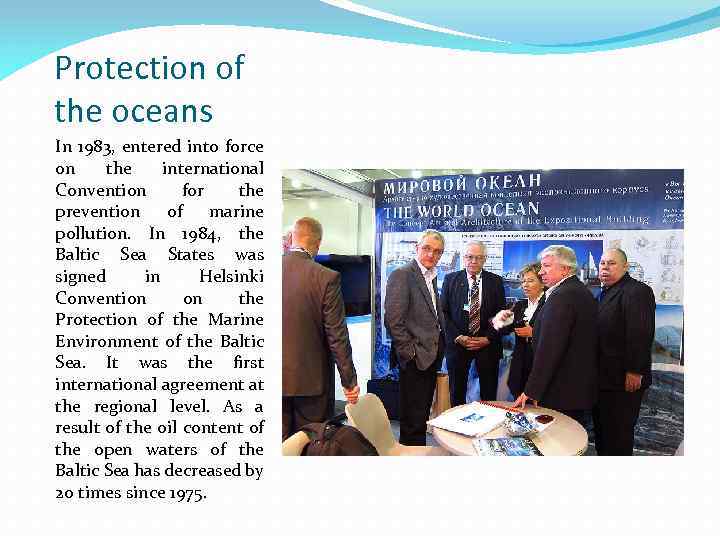 Protection of the oceans In 1983, entered into force on the international Convention for the prevention of marine pollution. In 1984, the Baltic Sea States was signed in Helsinki Convention on the Protection of the Marine Environment of the Baltic Sea. It was the first international agreement at the regional level. As a result of the oil content of the open waters of the Baltic Sea has decreased by 20 times since 1975.
Protection of the oceans In 1983, entered into force on the international Convention for the prevention of marine pollution. In 1984, the Baltic Sea States was signed in Helsinki Convention on the Protection of the Marine Environment of the Baltic Sea. It was the first international agreement at the regional level. As a result of the oil content of the open waters of the Baltic Sea has decreased by 20 times since 1975.
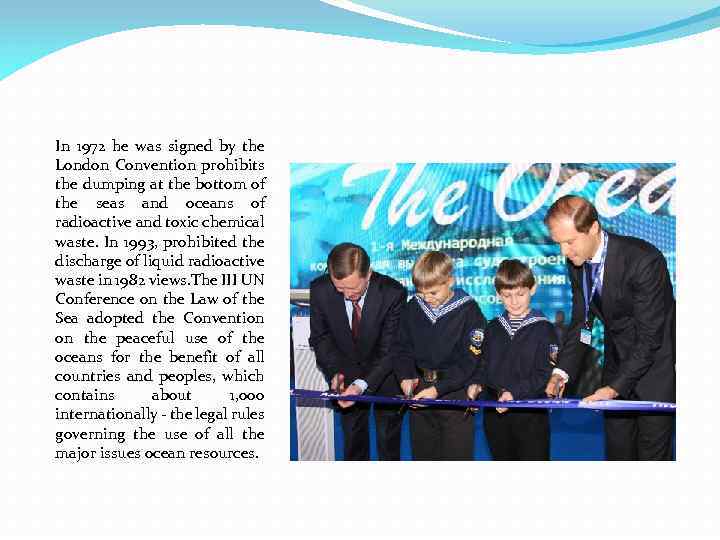 In 1972 he was signed by the London Convention prohibits the dumping at the bottom of the seas and oceans of radioactive and toxic chemical waste. In 1993, prohibited the discharge of liquid radioactive waste in 1982 views. The III UN Conference on the Law of the Sea adopted the Convention on the peaceful use of the oceans for the benefit of all countries and peoples, which contains about 1, 000 internationally - the legal rules governing the use of all the major issues ocean resources.
In 1972 he was signed by the London Convention prohibits the dumping at the bottom of the seas and oceans of radioactive and toxic chemical waste. In 1993, prohibited the discharge of liquid radioactive waste in 1982 views. The III UN Conference on the Law of the Sea adopted the Convention on the peaceful use of the oceans for the benefit of all countries and peoples, which contains about 1, 000 internationally - the legal rules governing the use of all the major issues ocean resources.
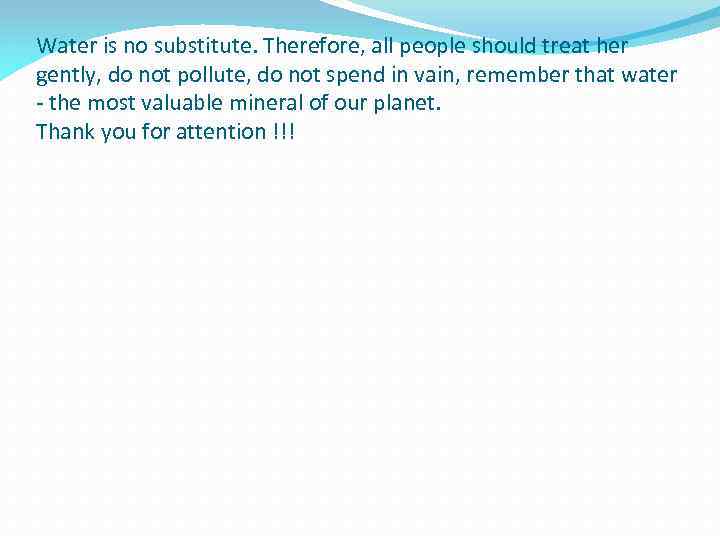 Water is no substitute. Therefore, all people should treat her gently, do not pollute, do not spend in vain, remember that water - the most valuable mineral of our planet. Thank you for attention !!!
Water is no substitute. Therefore, all people should treat her gently, do not pollute, do not spend in vain, remember that water - the most valuable mineral of our planet. Thank you for attention !!!
